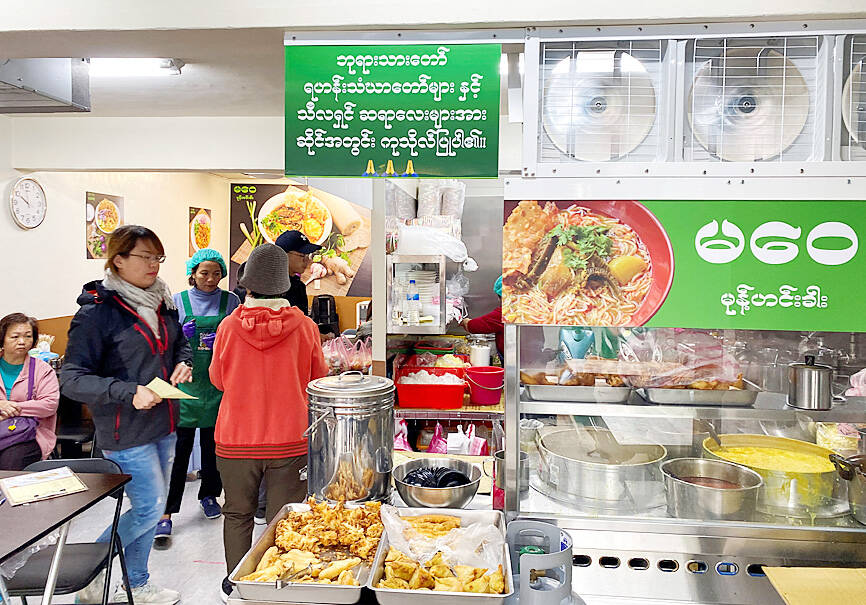Win Win has been glued to social media for the past day, trying to work out whether her family in Myanmar’s Mandalay survived Friday’s powerful earthquake, distracting herself at the Taiwan restaurant where she works by serving samosas and other snacks.
“We spoke last night but then nothing today. I can’t get through. I’m so scared for them,” Win Win, one of Taiwan’s estimated 50,000 Sino-Burmese, said yesterday at the eatery in Little Myanmar in New Taipei City.
Myanmar’s second-largest city, Mandalay, which lies close to the epicenter of the magnitude 7.7 quake, has a large ethnic Chinese population, many of whom have ties to Taiwan, whose government has offered to send rescue teams.

Photo: REUTERS
The Ministry of Foreign Affairs said it has yet to receive a response to that offer.
Yee Yu Nai, sitting at a snack store in Little Myanmar, scrolled through her phone looking for the latest news from Mandalay, where her sister lives.
“I know their house is OK as it was newly built, but the street is very badly damaged,” she said.
Taiwan’s Burmese community traces its history back to the end of the Chinese Civil War in 1949, when many of the defeated Republic of China soldiers fled into what was then called Burma before eventually being evacuated to Taiwan.
Others have come more recently, fleeing repression and anti-Chinese sentiment.
Ethnic Chinese in Myanmar have historically faced discrimination, especially under the rule of General Ne Win, who seized power in 1962.
He barred ethnic Chinese and other foreigners from owning land, banned Chinese-language education and stoked anti-Chinese violence. Bloody anti-Chinese riots erupted in 1967.
Another resident of Taiwan’s Little Myanmar, who asked to be identified by her family name of Huang to avoid repercussions for her relatives still in the country, said the precarious state of civil strife-hit Myanmar was her biggest concern.
“I just don’t think anyone is coming to save them,” she said of her relatives still in Mandalay.
Separately yesterday, the Ministry of Education said school counselors would begin reaching out to Burmese students in Taiwan to offer support, while academic advisors have been instructed to assess their living conditions on campus.
The ministry said it was concerned that the students might experience anxiety and distress over the well-being of family members in Myanmar.
There are 2,973 Burmese studying in Taiwan, it said, adding that universities have been asked to offer flexible course arrangements or alternative teaching methods for those who might need to temporarily return home.
Any leave or class absences taken by students to return home and manage family matters due to the earthquake would not be recorded in their attendance records, the Ministry of Education said, adding that it would continue to monitor the situation closely and work with schools to ensure that Burmese students receive comprehensive support.
Burmese students in need can also call the Network for International Student Advisors hotline at 0800-787-007, which operates from 9am to 5pm on weekdays, it said.
Additional reporting by Rachel Lin

TRAFFIC SAFETY RULES: A positive result in a drug test would result in a two-year license suspension for the driver and vehicle, and a fine of up to NT$180,000 The Ministry of Transportation and Communications is to authorize police to conduct roadside saliva tests by the end of the year to deter people from driving while under the influence of narcotics, it said yesterday. The ministry last month unveiled a draft of amended regulations governing traffic safety rules and penalties, which included provisions empowering police to conduct mandatory saliva tests on drivers. While currently rules authorize police to use oral fluid testing kits for signs of drug use, they do not establish penalties for noncompliance or operating procedures for officers to follow, the ministry said. The proposed changes to the regulations require

Taipei, New Taipei City, Keelung and Taoyuan would issue a decision at 8pm on whether to cancel work and school tomorrow due to forecasted heavy rain, Keelung Mayor Hsieh Kuo-liang (謝國樑) said today. Hsieh told reporters that absent some pressing reason, the four northern cities would announce the decision jointly at 8pm. Keelung is expected to receive between 300mm and 490mm of rain in the period from 2pm today through 2pm tomorrow, Central Weather Administration data showed. Keelung City Government regulations stipulate that school and work can be canceled if rain totals in mountainous or low-elevation areas are forecast to exceed 350mm in

1.4nm WAFERS: While TSMC is gearing up to expand its overseas production, it would also continue to invest in Taiwan, company chairman and CEO C.C. Wei said Taiwan Semiconductor Manufacturing Co (TSMC) has applied for permission to construct a new plant in the Central Taiwan Science Park (中部科學園區), which it would use for the production of new high-speed wafers, the National Science and Technology Council said yesterday. The council, which supervises three major science parks in Taiwan, confirmed that the Central Taiwan Science Park Bureau had received an application on Friday from TSMC, the world’s largest contract chipmaker, to commence work on the new A14 fab. A14 technology, a 1.4 nanometer (nm) process, is designed to drive artificial intelligence transformation by enabling faster computing and greater power

China Airlines Ltd (CAL) yesterday morning joined SkyTeam’s Aviation Challenge for the fourth time, operating a demonstration flight for “net zero carbon emissions” from Taiwan Taoyuan International Airport to Bangkok. The flight used sustainable aviation fuel (SAF) at a ratio of up to 40 percent, the highest proportion CAL has achieved to date, the nation’s largest carrier said. Since April, SAF has become available to Taiwanese international carriers at Taipei International Airport (Songshan airport), Kaohsiung International Airport and Taoyuan airport. In previous challenges, CAL operated “net zero carbon emission flights” to Singapore and Japan. At a ceremony at Taoyuan airport, China Airlines chief sustainability